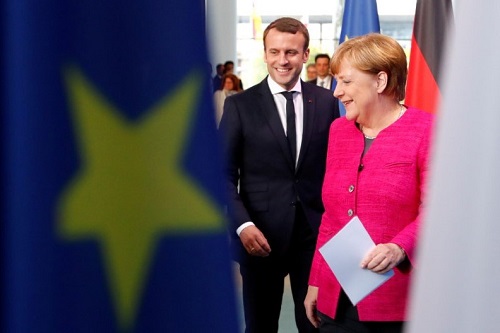Fabrizio Bensch/Reuters
By
Noah Barkin
Back in January, when his chances of winning the French presidency were considered slim, Emmanuel Macron came to Berlin and spelled out what he felt was needed to fix Europe.
“As Jacques Delors said, for Europe we need a vision and a screwdriver,” Macron told an audience at the Humboldt University, citing the former president of the European Commission. “Unfortunately, we currently have a lot of screwdrivers but we are still lacking a vision.”
Now, less than two months after surging to victory in the French election, Macron is filling the void, articulating a path forward for the continent, and crucially, bringing Germany along with him.
That was the main take-away from a meeting of European Union leaders last week in which Macron and German Chancellor Angela Merkel stood side by side at an end-of-summit news conference and sent a message of total unity.
After more than a decade of sputtering and stalling, it may be premature to declare that the Franco-German engine is revving on all cylinders again.
Macron still faces the daunting challenge of delivering on his plans to reform the French economy. Only if he is successful will he end the mutual distrust between Paris and Berlin that has prevented close cooperation in past years.
Merkel, for her part, must win a fourth term in September. If she does, she could still struggle to convince sceptical conservative allies to work with the centrist Macron.
But the past weeks, culminating in the joint appearance in Brussels on Friday, have helped lay to rest two of the big question marks that loomed over Macron’s election victory last month: whether he could maintain the momentum that propelled him into the Elysee Palace, and whether Merkel would be prepared to embrace his ideas on Europe.
For the past decade, as the continent lurched from one crisis to the next, Merkel seemed more comfortable making gradual adjustments to European structures, like tightening screws with a screwdriver, than coming up with inspiring new visions.
Now, with Europe out of acute crisis mode and feeling more confident against a backdrop of economic growth and political disarray in Britain and the United States, the 39-year-old Macron, emboldened by his party’s strong performance in parliamentary elections this month, is stepping into the breach.
FULL WEIGHT
In Brussels, he made clear that he would not shy away from confronting countries like Poland and Hungary if their right-wing governments failed to respect European democratic values.
He promised to respond in kind if countries like China and the United States do not play fair on trade. And he pressed his fellow leaders to embrace a more ambitious approach to European defence cooperation.
On all three of these issues, Merkel’s instinct in the past would have been to soft-pedal out of concern for sensitivities in Warsaw, Budapest, Washington, Beijing and – on the issue of defence – in Germany.
But in Brussels she threw her full weight behind Macron. This did not go unnoticed in other EU delegations, particularly among eastern Europeans unsettled by the looming departure of Britain and the erratic U.S. presidency of Donald Trump.
“If the (Franco-German) engine works too well it is not always the best for the EU,” said a senior EU diplomat from an eastern country. “We hope that they will be wise enough to control their speed.”
Officials in Britain and the United States are also uneasy.
A more confident, assertive Europe is likely to be a tougher counterpart in Brexit negotiations. At the summit, British Prime Minister Theresa May looked diminished and defensive next to the rejuvenated duo of Merkel and Macron.
While applauding the political momentum in Europe generated by Macron’s victory over far-right leader Marine Le Pen, Charles Kupchan, a former European adviser to U.S. President Barack Obama, expressed concern that a bolder, brasher Europe might end up defining itself in opposition to Washington.
“I worry about that,” Kupchan said. “The worst outcome is a revived European project that is in part about breaking with the United States.”
That seems unlikely given Merkel’s Atlanticist leanings.
But with an election looming, she has shown a willingness speak out more forcefully against the Trump administration, which is deeply unpopular in Germany.
Earlier this month, she surprised people at home and abroad by stating that Europe may not be able to rely on the United States any longer and must prepare to fend for itself.
Whether she persists with this defiant line at a G20 summit she will host in Hamburg on July 7-8 will be telling.
EURO ZONE
One of Europe’s biggest challenges, reform of the euro zone, was not a major topic at the meeting of EU leaders in Brussels.
But it is the focus of intense talks between Berlin and Paris ahead of a meeting of the two governments a week after the G20 in which a number of new bilateral initiatives are expected to be unveiled.
Here too, Merkel has shown a readiness to move towards Macron.
Speaking at an industry conference in Berlin last week before the EU summit, she surprised members of her own party by expressing an openness to two of Macron’s most controversial ideas – the creation of a budget and a finance minister for the euro zone.
“That really got people’s attention,” said a senior French official who is involved in the preparations of the Franco-German meeting. “Paris and Berlin are edging closer than they have been in a very long time.”
Thomson Reuters Foundation, the charitable arm of Thomson Reuters, that covers humanitarian news, women’s rights, trafficking, property rights and climate change.



No Comments Yet!
You can be first to comment this post!